Nicotine / THR - Statements from Organizations: Difference between revisions
(Changed page header) |
No edit summary |
||
| Line 1: | Line 1: | ||
[[File:Header for comments by orgs.jpg|frame|center|THR statements]] | [[File:Header for comments by orgs.jpg|frame|center|THR statements]] | ||
Thank-you Charles A. Gardner, PhD for the [https://twitter.com/ChaunceyGardner/status/1382413689060519945 original compilation of this list]. Thank-you to the volunteers from around the world who provide statements for us to add to this collection! <br> | Thank-you Charles A. Gardner, PhD for the [https://twitter.com/ChaunceyGardner/status/1382413689060519945 original compilation of this list]. Thank-you to the volunteers from around the world who provide statements for us to add to this collection! <br> | ||
=''' | ='''"SAFER than smoking"'''= | ||
<br> | <br> | ||
Revision as of 20:32, 21 May 2021
Thank-you Charles A. Gardner, PhD for the original compilation of this list. Thank-you to the volunteers from around the world who provide statements for us to add to this collection!
"SAFER than smoking"
World Health Organization EURO Office
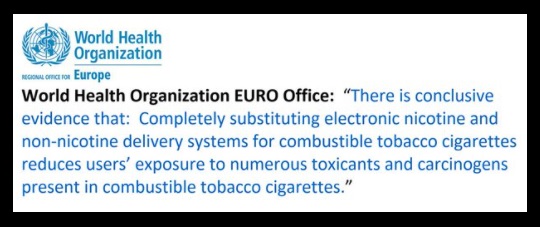
International Agency for Research on Cancer
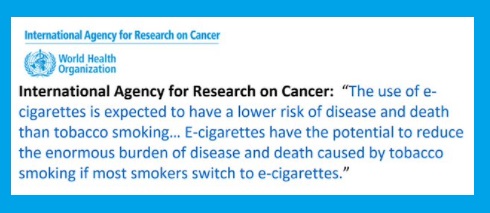
Cochrane Systematic Review

Public Health England
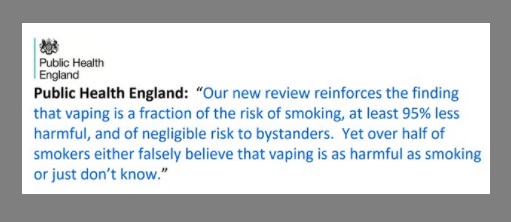
Royal College of Physicians
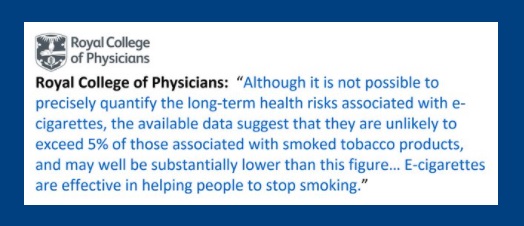
National Institute for Health and Care Excellence

British Medical Association
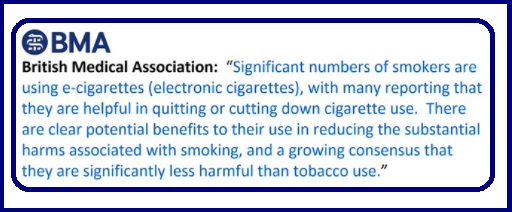
Cancer Research UK
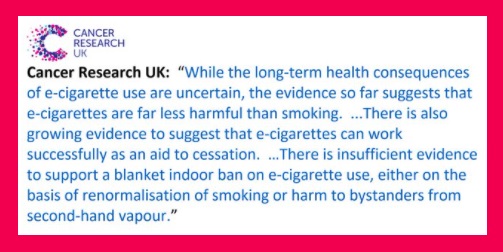
British Lung Foundation

Roy Castle Lung Cancer Foundation
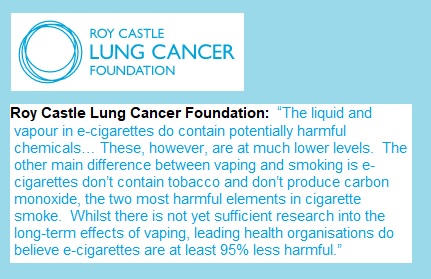
Royal College of General Practitioners

Royal Society for Public Health

Stroke Association UK

Action on Smoking and Health UK

National Centre for Smoking Cessation and Training

British Heart Foundation
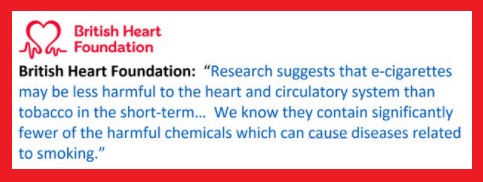
National Fire Chiefs Council

London Fire Brigade

National Health Service Scotland:

This statement was created and endorsed by: Action on Smoking & Health Scotland • Cancer Research UK • Chest Heart & Stroke Scotland • Chief Medical Officer for Scotland • NHS Ayrshire and Arran • NHS Greater Glasgow and Clyde • NHS Lothian • NHS Tayside • Roy Castle Lung Cancer Foundation • Royal College of General Practitioners • Royal College of Physicians of Edinburgh • Royal College of Physicians and Surgeons of Glasgow • Royal Environmental Health Institute of Scotland • Scottish Collaboration for Public Health Research and Policy • Scottish Consultants in Dental Health • Scottish Thoracic Society • UK Centre for Tobacco & Alcohol Studies • University of Edinburgh • University of Stirling
Health Service Executive Ireland

“The HSE cannot recommend e-cigarettes as a smoking cessation aid, as they are not currently regulated or approved in Ireland for that purpose. However, for those unable or unwilling to stop using nicotine, using e-cigarettes (also known as ‘vaping’) is generally regarded as less harmful than smoking tobacco. We recommend that smokers trying to quit smoking by using e-cigarettes do so in combination with approved supports." (Note: This is from a news article, not from an official policy statement)
"The Health and Safety Executive (HSE) and the Chartered Institute of Personnel and Development (CIPD) also caution against workplace bans on e-cigarettes. HSE’s advice is that “an employer needs to consider e-cigarettes in the wider context of risk in the workplace. We are aware that some organisations have banned their use, but this is not something HSE has advised on.”
New Zealand Ministry of Health:

Cancer Society of New Zealand:

“E-cigarettes and smokeless tobacco products are less harmful than tobacco smoking.”
Royal Australian & New Zealand College of Psychiatrists (RANZCP):

Drug and Alcohol Nurses of Australasia:

Royal Australian College of Physicians:

German Federal Institute for Risk Assessment:

“According to current knowledge, e-cigarettes are less harmful than conventional tobacco products when used as intended.”
French National Academy of Medicine:

French National Academy of Pharmacy:

“The World Health Organization’s anti-e-cigarette position is incomprehensible. Tobacco is responsible for 73,000 deaths in France. The e-cigarette helps people quit smoking. Its components are obviously less harmful than tobacco.” (NOTE: This is a Tweet from the Académie Nationale de Pharmacie. Not an official position statement.)
French National Cancer Institute:

US National Academies of Sciences, Engineering and Medicine:

US Food & Drug Administration:

US Centers for Disease Control:

American Cancer Society:

“Based on currently available evidence, using current generation e-cigarettes is less harmful than smoking cigarettes.” (NOTE: This was the official statement from 2018-2019. As ofNovember 2019, ACS no longer recommends e-cigarettes as a smoking cessation tool. Their stated reason for this change was “e-cigarette use by young people.” Their new statement still says, “former smokers now using e-cigarettes should not revert to smoking.”)
American Heart Association:

American Association of Public Health Physicians:

Campaign for Tobacco-Free Kids (CTFK / TFKAF) :

Government of Canada:

While evidence is still emerging, some evidence suggests that using e-cigarettes is linked to improved rates of success. While quitting cigarettes, you may go through a time when you use both cigarettes and vaping products. Switching from tobacco cigarettes to vaping will reduce your exposure to many toxic and cancer causing chemicals.
Canadian Heart & Stroke Foundation:
